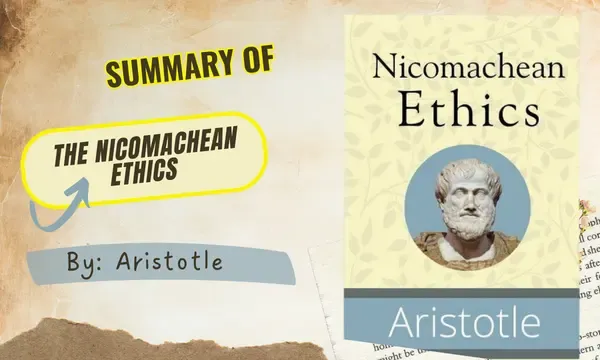The main topic of "The Nicomachean Ethics" by Aristotle is the pursuit of happiness and the good life. Aristotle explores the nature of ethics and provides guidance on how individuals can lead virtuous and fulfilling lives.
 |
| Summary of The Nicomachean Ethics by Aristotle |
The general idea of The Nicomachean Ethics
- Telos and Eudaimonia: Aristotle argues that the ultimate purpose or telos of human life is to achieve eudaimonia, often translated as "flourishing" or "well-being." Eudaimonia is attained through virtuous actions and the development of excellent character traits.
- Virtue and the Mean: Aristotle emphasizes the importance of virtue, which lies between extremes. He introduces the concept of the "golden mean," which suggests that virtuous behavior involves finding the moderate, balanced path between excess and deficiency.
- Ethical Virtues: Aristotle identifies several ethical virtues, including courage, temperance, generosity, and justice. These virtues are cultivated through habitual practice and are essential for leading a virtuous life.
- Intellectual Virtues: Alongside ethical virtues, Aristotle discusses intellectual virtues such as wisdom, understanding, and practical reason. These virtues enable individuals to make good judgments and reason about moral and practical matters.
- Friendship: Aristotle argues that friendship is an essential component of the good life. He explores different types of friendship and highlights the value of virtuous friendships based on mutual admiration and shared values.
- The Role of Education: Aristotle stresses the significance of education and habituation in the development of virtues. He suggests that individuals can acquire virtuous habits through proper upbringing and engaging in activities that promote virtuous behavior.
Chapters of The Nicomachean Ethics
- Book I: The Good for Man: In this section, Aristotle explores the nature of the good life and introduces the concept of eudaimonia. He discusses how virtue and reason contribute to human flourishing and sets the foundation for his ethical framework.
- Book II: Moral Virtue: Aristotle delves into the concept of moral virtue, emphasizing the importance of habituation and the role of emotions and desires in shaping human character. He introduces the idea of the mean and provides examples of virtuous and vicious behaviors.
- Book III: Voluntary Action, Choice, and Character: This section focuses on the voluntary nature of actions and the connection between choice, character, and moral responsibility. Aristotle examines the role of pleasure and pain in influencing human behavior and highlights the importance of choosing virtuous actions willingly.
- Book IV: Justice and Friendship: Aristotle delves into the nature of justice, distinguishing between different types of justice and exploring their applications. He also discusses the role of friendship in the good life and examines the qualities and characteristics of true friendship.
- Book V: Intellectual Virtues: This section focuses on intellectual virtues, particularly practical wisdom or phronesis. Aristotle explains how practical wisdom allows individuals to make good decisions and exercise moral judgment. He also touches on the role of theoretical wisdom and the contemplative life.
- Book VI: Continence and Incontinence: Aristotle addresses the concepts of continence and incontinence, discussing situations where individuals act against their better judgment. He explores the factors that influence these behaviors and highlights the importance of self-control and self-awareness.
- Book VII: Pleasure and Happiness: Aristotle examines the role of pleasure in the good life, distinguishing between different types of pleasures and their relationship to virtue. He concludes that the highest form of pleasure is derived from virtuous activities and leads to a state of true happiness.
Conclusions of The Nicomachean Ethics
- The ultimate goal of human life is eudaimonia, which is achieved through virtuous actions and the development of excellent character.
- Virtue lies in finding the mean between extremes, and ethical virtues are cultivated through habituation and practice.
- Intellectual virtues, such as practical wisdom, are crucial for making good moral judgments.
- Friendship is an important aspect of the good life, particularly virtuous friendships based on shared values.
- Education and habituation play a vital role in the cultivation of virtues.
About the author of The Nicomachean Ethics
Aristotle (384–322 BCE) was a Greek philosopher and polymath. He was a student of Plato and went on to become the tutor of Alexander the Great. Aristotle made significant contributions to numerous fields, including ethics, politics, metaphysics, biology, and logic. His work laid the foundations for Western philosophy and has had a lasting influence on intellectual thought.
Summary of Digital Minimalism by Cal Newport
Summary of Nausea by Jean Paul Sartre
The Nicomachean Ethics book in relation to other books
"The Nicomachean Ethics" is one of the most significant works in the field of ethics. It is often compared to Plato's "Republic" and "Phaedrus" due to their shared exploration of moral philosophy and the nature of the good life. While Plato's works focus on ideal forms and the nature of justice, Aristotle's "Nicomachean Ethics" provides a practical approach to ethics and emphasizes the cultivation of virtues.
The audience of The Nicomachean EthicsThe book is intended for readers interested in moral philosophy and ethical theories. It is suitable for students, scholars, and individuals seeking guidance on leading a virtuous and fulfilling life.
The publication date of The Nicomachean Ethics
"The Nicomachean Ethics" was not published during Aristotle's lifetime. The exact first publication date is unknown, but the book was likely compiled and published by Aristotle's students after his death. Various translations and editions have been published by different publishers over the centuries.
Recommendations for other books
- "Meditations" by Marcus Aurelius: This book offers a Stoic perspective on ethics and the good life.
- "Groundwork of the Metaphysics of Morals" by Immanuel Kant: Kant explores ethical theories and the concept of duty.
- "Utilitarianism" by John Stuart Mill: Mill presents a consequentialist approach to ethics, focusing on the maximization of happiness.
